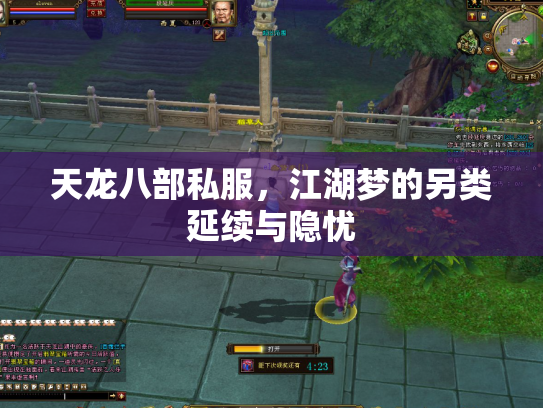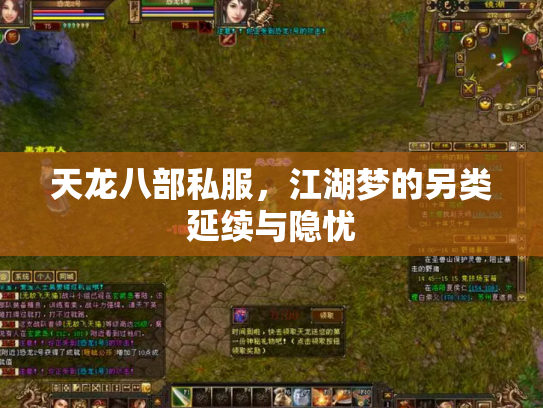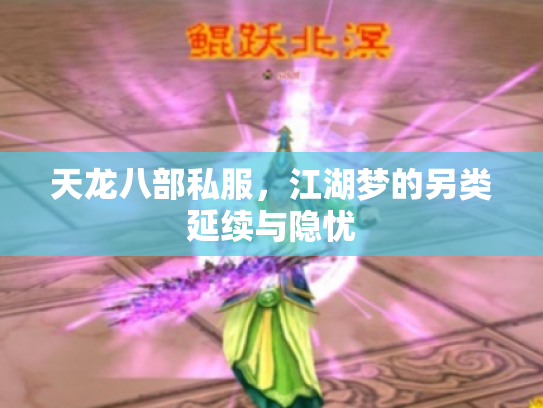天龙八部私服,江湖梦的另类延续与隐忧
- 2025-09-05
- 14
在虚拟世界的江湖中,《天龙八部》正版游戏凭借金庸先生的武侠巨著背景,构建了一个充满爱恨情仇的武侠宇宙。 alongside the official servers, a parallel universe has long existed—the private servers of "天龙SF" (TianLong SF). These private servers not only provide players with an alternative experience but also reflect the complex desires and controversies within the gaming community. This article will explore the rise of天龙SF, its appeal, potential risks, and its impact on the gaming ecosystem.
天龙SF的兴起:自由与个性化的追求

天龙SF, or private servers for "天龙八部," emerged not long after the official game's launch. These servers are typically operated by third parties without authorization from the official developers. Their rise can be attributed to players' dissatisfaction with the official servers' mechanics, such as the pay-to-win model, slow updates, or restrictive gameplay. In天龙SF, operators often modify game parameters—increasing experience rates, dropping rare items more frequently, or even creating custom storylines—to cater to players' desires for a "perfect"武侠世界.
For many,天龙SF represents a form of resistance against the commercialization of gaming. In official servers, players might need to spend significant time or money to achieve high levels or obtain top equipment, whereas天龙SF offers a shortcut to fulfillment. This sense of control and immediacy taps into the human psyche's craving for instant gratification and autonomy. For example, some天龙SF versions allow players to experience end-game content without the grind, fostering a community that values leisure and exploration over competition.
However, the operation of天龙SF often involves legal and ethical gray areas. Since these servers use pirated source code or reverse-engineered software, they infringe on intellectual property rights, leading to potential crackdowns by authorities. Despite this, the allure of天龙SF persists, driven by a deep-seated nostalgia for the classic game and a yearning for a more equitable virtual society.
天龙SF的吸引力:社区与创新的融合

One of the key reasons players flock to天龙SF is the strong sense of community. These servers often have smaller, tight-knit player bases where everyone knows each other, reminiscent of early online gaming days. Players can form bonds more easily, share strategies, and even participate in server events organized by administrators. This social aspect is enhanced by the customized features of天龙SF, such as unique quests or modified classes, which encourage collaboration and creativity.
Moreover,天龙SF serves as a testing ground for innovation. Some servers introduce entirely new gameplay elements—like cross-server battles or player-driven economies—that might not be feasible in official versions due to commercial constraints. This experimentation can sometimes influence official game updates, as developers take note of what resonates with players. For instance, a popular天龙SF might trial a new combat system that later gets incorporated into the official game, blurring the lines between official and private realms.
Yet, this innovation comes with risks. The lack of regulation in天龙SF means that imbalances or bugs can ruin the experience. Operators might abruptly shut down servers due to legal issues or financial problems, leaving players with lost progress and frustration. This volatility highlights the double-edged sword of天龙SF: while it offers freedom, it also lacks the stability and support of official services.
天龙SF的隐忧:安全与道德困境

Despite its appeal,天龙SF is fraught with dangers. Security is a major concern, as private servers often lack robust protection against hackers. Players might expose their personal information, such as email addresses or even financial details, to malicious actors. There have been cases where天龙SF operators themselves engaged in data theft or scams, exploiting players' trust for profit. This underscores the importance of caution when engaging with unofficial platforms.
Ethically,天龙SF raises questions about fairness and sustainability. While it provides an alternative, it undermines the efforts of official developers who invest resources in creating and maintaining the game. This can lead to a decline in official server populations, potentially harming the long-term viability of the game. Additionally, the prevalence of天龙SF normalizes piracy, which may discourage innovation in the gaming industry as a whole.
From a psychological perspective,天龙SF can exacerbate addictive behaviors. The ease of achieving goals might lead players to spend excessive time in-game, neglecting real-life responsibilities. This is particularly true for servers that promise "unlimited" resources, creating a cycle of dependency that mirrors issues seen in official games but without the safeguards often implemented by licensed operators.
天龙SF与官方游戏的共生与冲突

The relationship between天龙SF and official servers is complex. On one hand,天龙SF can act as a catalyst for change, pushing official developers to improve their offerings based on player feedback from private servers. For example, if a天龙SF introduces a popular feature, the official game might adopt it to retain players. This symbiotic dynamic suggests that private servers, despite their illegality, can contribute positively to the evolution of the game.
On the other hand,天龙SF directly competes with official services, siphoning off players and revenue. This conflict often leads to legal battles, with developers issuing cease-and-desist orders or pursuing litigation against server operators. In China, where "天龙八部" is highly popular, authorities have intensified crackdowns on private servers, emphasizing the importance of protecting intellectual property.
Ultimately, the persistence of天龙SF reflects a broader tension in the gaming world: the clash between corporate control and player agency. While official servers offer a polished, secure experience,天龙SF embodies a grassroots desire for customization and community. Balancing these aspects is crucial for the future of online gaming.
江湖梦的反思

天龙SF, as a phenomenon, is more than just a alternative to official gaming—it is a mirror reflecting players' dreams and disillusionments. It offers a space for experimentation and camaraderie but at the cost of legal and security risks. As players, it is essential to weigh the allure of天龙SF against its potential pitfalls, recognizing that the true spirit of the江湖 lies not just in virtual conquests but in responsible engagement.
For developers, the popularity of天龙SF signals a need for greater flexibility and player-centric design. By incorporating elements that players seek in private servers—such as faster progression or creative content—official games can reduce the appeal of unauthorized alternatives. In the end, whether in official or private realms, the江湖梦 continues to evolve, reminding us that the quest for a perfect world, virtual or otherwise, is an enduring human endeavor.
In this journey,天龙SF remains a controversial yet integral part of the tapestry, challenging us to rethink what it means to be part of a digital community.
